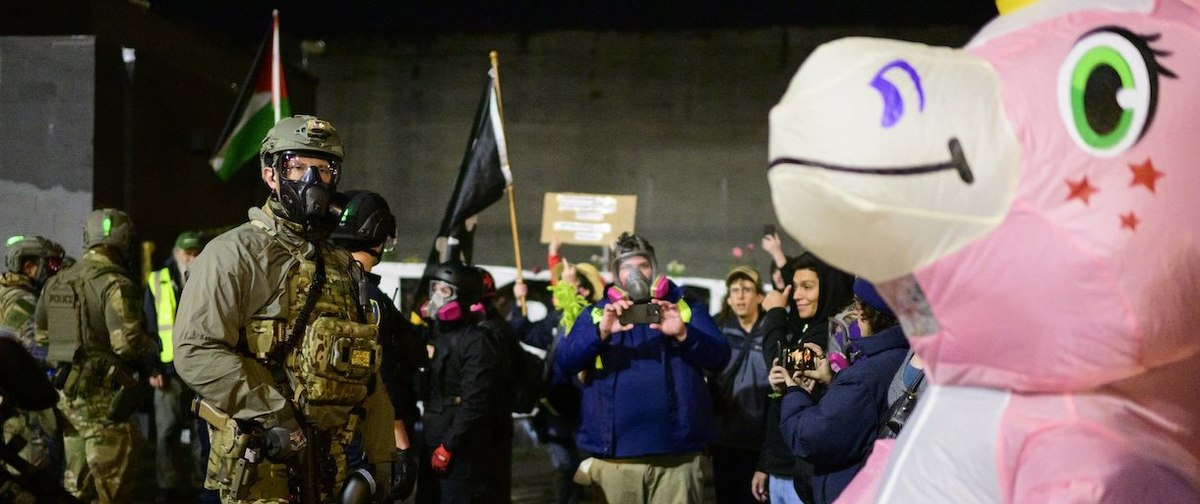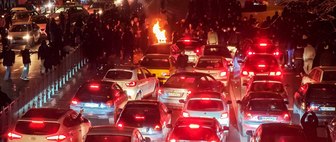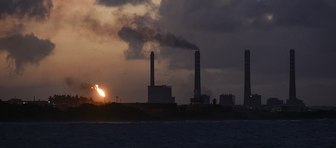During a speech to an assembled audience of U.S. generals and admirals in September, Donald Trump said that U.S. cities are war zones and the military needed to handle the "enemy from within." Trump has deployed National Guard troops to Los Angeles; Chicago; Washington, DC; and Portland, Oregon. He has discussed plans to send troops to several other cities. Do Americans agree that there is currently a war in U.S. cities?
YouGov polling on the day of Trump's statement found that only about one-quarter of Americans said that there is currently a war happening in any U.S. cities. But in a follow-up survey with more response options, we find that Americans are more likely to characterize the situation in cities as a "conflict" rather than a "war." We also find that one-third of those who believe there is a war or conflict in U.S. cities say that the government is mostly to blame for creating the situation.
One-quarter of Americans say there is a war in any U.S. cities
A recent YouGov poll found that about one-quarter (27%) of Americans say that there is currently a war happening in any U.S. cities. About half (52%) say there is not. Small shares of Democrats and Independents say there is a war in U.S. cities (19% of Democrats and 24% of Independents); majorities say there is not (64% of Democrats and 53% of Independents). But Republicans are almost evenly split: 37% say there is a war in U.S. cities and 39% say there is not. Americans who live in cities are least likely to say there is a war in any U.S. cities (23%, vs. 55% who say there is not). Americans who live in rural areas are most likely to say there is a war (31%), but this is still a smaller share than the 42% who say there is not.
Asking a yes-or-no question about whether there is a war in any U.S. cities may force some Americans to give responses that do not fully reflect their beliefs. Those who think there is a serious problem in American cities may say yes to this question even if they think calling the situation a war is too extreme, if it is closer to their view than saying there is no war at all. On the other hand, Americans who say there is not a war may still have significant concerns. To test this possibility, we asked Americans a similar question with an expanded set of response options. Respondents could say that there is a war, that there is a conflict but not a war, that there is neither a conflict nor a war, or that they are not sure.
Americans are far more likely to say there's a conflict in U.S. cities than to say there's a war
With a more expanded set of response options, the poll found that the share of Americans who say there is a war in any U.S. cities is 11%, compared to 27% according to the poll with the yes-or-no question. On the other hand, half (51%) of Americans say that there is a conflict but not a war in U.S. cities. Only 29% of Americans say there is neither a conflict nor a war in any U.S. cities, compared to 52% who say there is not a war according to the poll with the yes-or-no question.
Nearly half (44%) of Democrats say there is neither a war nor conflict in U.S. cities, much higher than the shares of Independents (27%) and Republicans (17%) who say so. But members of all three groups are much more likely to say there is a conflict but no war than to say there is a war. Americans who live in cities are more likely to say there is neither war nor conflict (35%) than are those who live outside cities. City dwellers, suburbanites, town folk, and rural residents are all more likely to say there is a conflict but no war than to say there is a war in any city.
One-third of Americans who think there is a war or conflict in U.S. cities say the government started it
There is one more wrinkle in American opinion of Trump's claim that the military is needed to clean up the war zones in American cities: Many Americans say the government is the aggressor in American cities. Of the Americans who believe there is either war or conflict in U.S. cities — a group that is disproportionately Republican — one-third (33%) say the situation has mostly been caused by the government fighting against people. That's similar to the 37% who say the problem has mostly been caused by people fighting the government, and larger than the 23% who say the problem is mostly people fighting against each other. The share who blame the government is similar among Americans who say that in American cities there is a war (31%) and among those who say there is a conflict but no war (33%).
Democrats who believe there is a war or conflict in U.S. cities are much more likely to blame the government (64%) than to blame people fighting against each other (14%) or against the government (20%). Independents are also more likely to think war or conflict has been caused by the government (39%) than by people fighting against each other (18%) or against the government (29%). On the other hand, about half (53%) of Republicans who believe there is a war or conflict say it has been caused by people fighting against the government and a further 34% say the problem has been caused by people fighting against each other. Only 7% say the government caused war or conflict in U.S. cities.
Of Americans who believe there is a war or conflict in U.S. cities, those who live in cities (36%) and towns (39%) are more likely to say the problem was caused by the government than are those in suburbs (31%) and rural areas (27%). Conversely, those who live in rural areas are more likely than those in other areas to say war or conflict has been caused by people fighting against the government.
— Taylor Orth and Carl Bialik contributed to this article
See the results for this YouGov survey
Related articles and surveys:
- What do Americans think about Trump and Hegseth's meeting with the generals and admirals?
- Trump's agenda, crime, the National Guard, museums, slavery, and reading books: August 22 - 25, 2025 Economist/YouGov Poll
- How Americans describe New York, Los Angeles, and other major U.S. cities
- About half of Americans say Trump’s plan to deploy US military on American cities is inappropriate
- Most Americans feel safe in their own community, big cities still scare many
Methodology: This YouGov poll was conducted online on October 8 -12, 2025 among 1,065 U.S. adult citizens. Respondents were selected from YouGov’s opt-in panel to be representative of adult U.S. citizens. The sample was weighted according to gender, age, race, education, region, 2024 presidential vote, 2020 election turnout and presidential vote, baseline party identification, and current voter registration status. Demographic weighting targets come from the 2019 American Community Survey. 2024 presidential vote, at time of weighting, was estimated to be 48% Harris and 50% Trump. Baseline party identification is the respondent’s most recent answer given around November 8, 2024, and is weighted to the estimated distribution at that time (31% Democratic, 32% Republican). The margin of error for the overall sample is approximately 4%.
Image: Getty (Mathieu Lewis-Rolland / Stringer)
What do you really think about President Trump, American politics in general, and everything else? Share your reality, join the YouGov panel, and get paid to share your thoughts. Sign up here.







